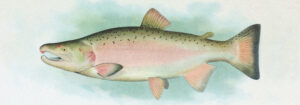
Because of the diverse sources of the salmon, the survival rates of the young fish are higher, and in cases of mishap or disease, losses are confined to a single incubator rather than an entire hatchery. While the approach is primarily used with salmon in the Northwest, Johnson says that the same approach can be applied to other freshwater fish. This low-cost, low-tech approach could help increase populations of cutthroat, grayling, and bull trout.
The addition of these hatchlings could create more vibrant fisheries, which in turn could attract millions of tourist dollars. The landowners’ involvement in the restoration effort is another added benefit, helping to develop a sense of stewardship that could protect the fisheries for years into the future.
Bozeman Daily Chronicle


